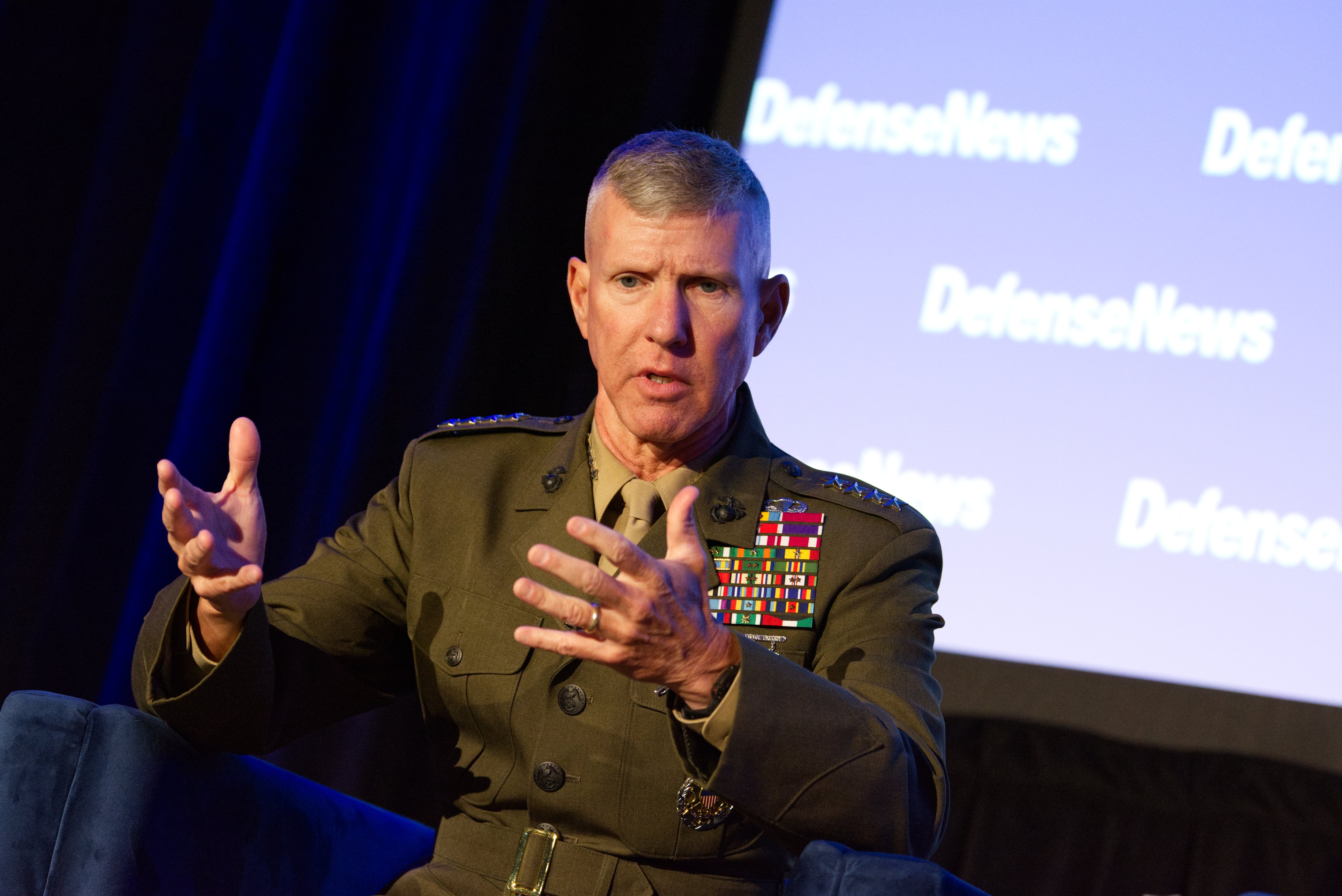ARLINGTON, Va. — The U.S. Marine Corps is processing through the annual budget process on schedule, the acting commandant said, adding that he’s worried that some spending needs may get lost in the shuffle as the service navigates the budget process without a Senate-confirmed leader at the top.
Gen. Eric Smith is the assistant commandant of the Marine Corps and also the acting commandant, after Gen. David Berger retired in July and the Senate has yet to vote on Smith for the service’s top-officer job amid a blanket hold on military nominations by Sen. Tommy Tuberville.
Smith, speaking Wednesday at the Defense News Conference in Arlintgon, Va., said he’s effectively balancing three full-time jobs: the assistant commandant, who oversees Marine readiness, safety and procurement; the acting service chief; and an acting member of the Joint Chiefs of Staff.
As a result, he’s having to delegate meetings with leaders at the Pentagon and on the Hill related to the fiscal 2025 budget process — and without a single messenger at all these meetings, he said he’s worried about “budget messaging.”
Smith said the process is moving forward at its normal pace — there won’t be any delay in the budget process despite three military services being led by acting leaders, since the budget is due to Congress by a certain date, and therefore budget requests are due to the defense secretary by a certain date.
“We’re very close to wrapping that up,” he said.
But he worries about what happens when the Department of Navy or Department of Defense may question a Marine budget priority in a meeting that he has delegated to another general.
Though he said the generals he’s delegating to are highly qualified, “I am responsible and accountable for the entire Marine Corps to the taxpayers, to Congress, and more importantly, to the parents of Marines” — and if his delegates report back to him about the disagreement and wait for Smith to follow up, it may be too late: the Pentagon may have made a decision and moved on by the time Smith can get looped in and weigh in.
Clock doesn’t stop
“That clock didn’t stop,” Smith said, and he just cannot be at all the meetings taking place as the FY25 budget comes together.
Unlike the Army, for example, the Marine Corps must mesh its budget request with that of the Navy to create a single Department of the Navy budget request to go up to the Defense Department, adding another level of budget negotiations. Last year, there were conflicts at this level surrounding the Navy wanting to decommission aging amphibious ships without buying their replacements, something the Marines fiercely objected to.
Smith tapped a couple three-star generals to help him attend these budget meetings as the FY25 Department of Navy proposal comes together, but that means they have to delegate some of their work to one-stars, who then delegate to lieutenant colonels — something Smith called unsustainable.
Additionally, he told reporters after his remarks at the conference, he worries about losing “synergy and cohesion and budget messaging” with multiple generals involved in these budget negotiations.
“If someone goes on my behalf to speak to Senator X, and I’m speaking to Senator Y, and there’s some slight dissonance because I use a different term, then those two senators may say, ‘well the Marine Corps doesn’t know what they want.’ Well, we know exactly what we want, it’s just, this officer used this term and I used this term — we’re saying the same thing, but I’m from Texas and that one is from Boston and we said it differently,” he joked, referring to Lt. Gen. Christopher Mahoney, the Marines’ top budget officer who has been nominated to serve as the next assistant commandant.
“It’s our responsibility to be cohesive. But two people telling the same story, there’s going to be dissonance in their telling of that story even though they both see the exact same thing. That causes me concern,” Smith said.
Though he could not yet share details of the Marines’ budget request for FY25, he said the service is “prepared for a flat or declining defense budget.”
He said he has three top priorities for the FY25 budget.
‘Quality of Life’
“Number one is the Marines, the individual Marine, their quality of life,” he said, explaining that quality of life spending directly affects his ability to recruit and retain a force willing to go fight a war if called upon.
“If they don’t have the barracks, the chow halls, the gyms, the child development centers that are required as they drop their kids off before they go to training — they’re not as ready to fight. For me, we always talk about our most lethal weapon on the battlefield is a Marine. We have to fund that,” he said, acknowledging that this is becoming more expensive but has to remain a top priority.
“Simultaneous is funding mobility and lethality,” he said.
This includes organic lift such as surface connectors and aircraft to move Marines around, as well as inter-service lift like amphibious ships from the Navy. It also includes things like long-range anti-ship missiles, loitering munitions and other weapons the Marines will introduce to the field or buy in greater numbers in the coming years.
Megan Eckstein is the naval warfare reporter at Defense News. She has covered military news since 2009, with a focus on U.S. Navy and Marine Corps operations, acquisition programs and budgets. She has reported from four geographic fleets and is happiest when she’s filing stories from a ship. Megan is a University of Maryland alumna.





